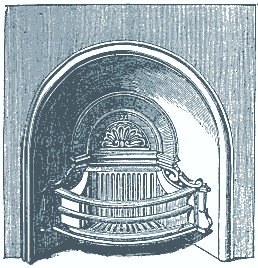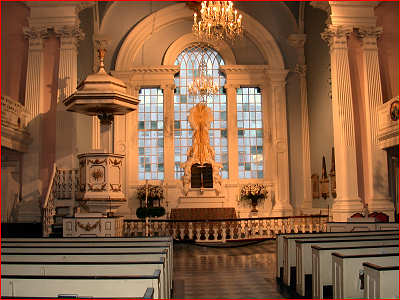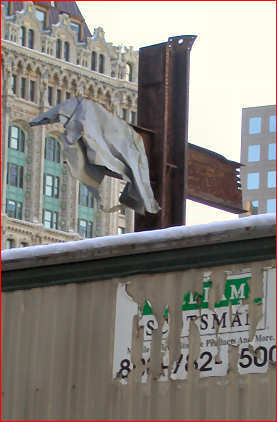Your weekly dose of SpurgeonPyroManiac devotes Monday space to highlights from The Spurgeon Archive. The following excerpt is from a sermon titled "The First Christmas Carol," originally preached Sunday Morning, December 20, 1857, at the Music Hall, Royal Surrey Gardens.
A Thought to Last the Whole Week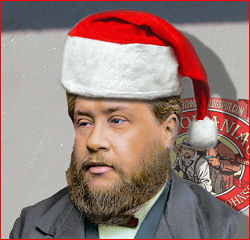
The angels sang something which men could understand—something which men ought to understand—something which will make men much better if they will understand it. The angels were singing about Jesus who was born in the manger. We must look upon their song as being built upon this foundation. They sang of Christ, and the salvation which he came into this world to work out. And what they said of this salvation was this: they said, first, that
it gave glory to God; secondly, that
it gave peace to man; and, thirdly, that
it was a token of God's good will towards the human race.1.
First, they said that this salvation gave glory to God. They had been present on many august occasions, and they had joined in many a solemn chorus to the praise of their Almighty Creator. They were present at the creation: "The morning stars sang together, and all the sons of God shouted for joy." They had seen many a planet fashioned between the palms of Jehovah, and wheeled by his eternal hands through the infinitude of space. They had sung solemn songs over many a world which the Great One had created. We doubt not, they had often chanted "Blessing and honour, and glory, and majesty, and power, and dominion, and might, be unto him that sitteth on the throne," manifesting himself in the work of creation.
I doubt not, too, that their songs had gathered force through ages. As when first created, their first breath was song, so when they saw God create new worlds then their song received another note; they rose a little higher in the gamut of adoration. But this time, when they saw God stoop from his throne, and become a babe, hanging upon a woman's breast, they lifted their notes higher still; and reaching to the uttermost stretch of angelic music, they gained the highest notes of the divine scale of praise, and they sung, "Glory to God
in the highest," for higher in goodness they felt God could not go.
Thus their highest praise they gave to him in the highest act of his godhead. If it be true that there is a hierarchy of angels, rising tier upon tier in magnificence and dignity—if the apostle teaches us that there be "angels, and principalities, and powers, and thrones, and dominions," amongst these blest inhabitants of the upper world—I can suppose that when the intelligence was first communicated to those angels that are to be found upon the outskirts of the heavenly world, when they looked down from heaven and saw the newborn babe, they sent the news backward to the place whence the miracle first proceeded, singing
"Angels, from the realms of glory,
Wing your downward flight to earth,
Ye who sing creation's story,
Now proclaim Messiah's birth;
Come and worship,
Worship Christ, the newborn King."And as the message ran from rank to rank, at last the presence angels, those four cherubim that perpetually watch around the throne of God—those wheels with eyes—took up the strain, and, gathering up the song of all the inferior grades of angels, surmounted the divine pinnacle of harmony with their own solemn chant of adoration, upon which the entire host shouted, "The highest angels praise thee."—"Glory to God in the highest." Ay, there is no mortal that can ever dream how magnificent was that song. Then, note, if angels shouted before and when the world was made, their hallelujahs were more full, more strong, more magnificent, if not more hearty, when they saw Jesus Christ born of the Virgin Mary to be man's redeemer—"Glory to God in the highest."
What is the instructive lesson to be learned from this first syllable of the angels' song? Why this, that salvation is God's highest glory. He is glorified in every dew drop that twinkles to the morning sun. He is magnified in every wood flower that blossoms in the copse, although it live to blush unseen, and waste its sweetness in the forest air. God is glorified in every bird that warbles on the spray; in every lamb that skips the mead. Do not the fishes in the sea praise him? From the tiny minnow to the huge Leviathan, do not all creatures that swim the water bless and praise his name? Do not all created things extol him? Is there aught beneath the sky, save man, that doth not glorify God? Do not the stars exalt him, when they write his name upon the azure of heaven in their golden letters? Do not the lightnings adore him when they flash his brightness in arrows of light piercing the midnight darkness? Do not thunders extol him when they roll like drums in the march of the God of armies? Do not all things exalt him, from the least even to the greatest?
But sing, sing, oh universe, till thou hast exhausted thyself, thou canst not afford a song so sweet as the song of Incarnation. Though creation may be a majestic organ of praise, it cannot reach the compass of the golden canticle—Incarnation! There is more in that than in creation, more melody in Jesus in the manger, than there is in worlds on worlds rolling their grandeur round the throne of the Most High.
Pause, Christian, and consider this a minute. See how every attribute is here magnified. Lo! what
wisdom is here. God becomes man that God may be just, and the justifier of the ungodly. Lo! what
power, for where is power so great as when it concealeth power? What power, that Godhead should unrobe itself and become man! Behold, what
love is thus revealed to us when Jesus becomes a man. Behold ye, what
faithfulness! How many promises are this day kept? How many solemn obligations are this hour discharged? Tell me one attribute of God that is not manifest in Jesus; and your ignorance shall be the reason why you have not seen it so. The whole of God is glorified in Christ; and though some part of the name of God is written in the universe, it is here best read—in Him who was the Son of Man, and, yet, the Son of God.
But, let me say one word here before I go away from this point. We must learn from this, that if salvation glorifies God, glorifies him in the highest degree, and makes the highest creatures praise him, this one reflection may be added—then, that doctrine which glorifies man in salvation cannot be the gospel. For salvation glorifies God. The angels were no Arminians, they sang, "Glory
to God in the highest." They believe in no doctrine which uncrowns Christ, and puts the crown upon the head of mortals. They believe in no system of faith which makes salvation dependent upon the creature, and, which really gives the creature the praise, for what is it less than for a man to save himself, if the whole dependence of salvation rests upon his own free will? No, my brethren; they may be some preachers, that delight to preach a doctrine that magnifies man; but in their gospel angels have no delight. The only glad tidings that made the angels sing, are those that put God first, God last, God midst, and God without end, in the salvation of his creatures, and put the crown wholly and alone upon the head of him that saves without a helper. "Glory to God in the highest," is the angels' song.
2. When they had sung this, they sang what they had never sung before. "Glory to God in the highest," was an old, old song; they had sung that from before the foundations of the world. But, now, they sang as it were a new song before the throne of God: for they added this stanza—
"on earth, peace."They did not sing that in the garden. There was peace there, but it seemed a thing of course, and scarce worth singing of. There was more than peace there; for there was glory to God there. But, now, man had fallen, and since the day when cherubim with fiery swords drove out the man, there had been no peace on earth, save in the breast of some believers, who had obtained peace from the living fountain of this incarnation of Christ. Wars had raged from the ends of the world; men had slaughtered one another, heaps on heaps. There had been wars within as well as wars without. Conscience had fought with man; Satan had tormented man with thoughts of sin. There had been no peace on earth since Adam fell.
But, now, when the newborn King made his appearance, the swaddling band with which he was wrapped up was the white flag of peace. That manger was the place where the treaty was signed, whereby warfare should be stopped between man's conscience and himself, man's conscience and his God. It was then, that day, the trumpet blew—"Sheathe the sword, oh man, sheathe the sword, oh conscience, for God is now at peace with man, and man at peace with God." Do you not feel my brethren, that the gospel of God is peace to man? Where else can peace be found, but in the message of Jesus?
Go legalist, work for peace with toil and pain, and thou shalt never find it. Go, thou, that trustest in the law: go thou, to Sinai; look to the flames that Moses saw, and shrink, and tremble, and despair; for peace is nowhere to be found, but in him, of whom it is said, "This man shall be peace." And what a peace it is, beloved! It is peace like a river, and righteousness like the waves of the sea. It is the peace of God that passeth all understanding, which keeps our hearts and minds through Jesus Christ our Lord. This sacred peace between the pardoned soul and God the pardoner; this marvelous at-one-ment between the sinner and his judge, this was it that the angels sung when they said, "peace on earth."
3. And, then, they wisely ended their song with a third note. They said, "Good will to man."
Philosophers have said that God has a good will toward man; but I never knew any man who derived much comfort from their philosophical assertion. Wise men have thought from what we have seen in creation that God had much good will toward man, or else his works would never have been so constructed for their comfort; but I never heard of any man who could risk his soul's peace upon such a faint hope as that.
But I have not only heard of thousands, but I know them, who are quite sure that God has a good will towards men; and if you ask their reason, they will give a full and perfect answer. They say, he has good will toward man for he gave his Son. No greater proof of kindness between the Creator and his subjects can possibly be afforded than when the Creator gives his only begotten and well beloved Son to die.
Though the first note is God-like, and though the second note is peaceful, this third note melts my heart the most.
Some think of God as if he were a morose being who hated all mankind. Some picture him as if he were some abstract subsistence taking no interest in our affairs. Hark ye, God has "good will toward men." You know what good will means. Well, Swearer, you have cursed God; he has not fulfilled his curse on you; he has good will towards you, though you have no good will towards him. Infidel, you have sinned high and hard against the Most High; he has said no hard things against you, for he has good will towards men. Poor sinner, thou hast broken his laws; thou art half afraid to come to the throne of his mercy lest he should spurn thee; hear thou this, and be comforted—God has good will towards men, so good a will that he has said, and said it with an oath too, "As I live, saith the Lord, I have no pleasure in the death of him that dieth, but had rather that he should turn unto me and live;" so good a will moreover that he has even condescended to say, "Come, now, let us reason together; though your sins be as scarlet, they shall be as wool; though they be red like crimson, they shall be whiter than snow."
And if you say, "Lord, how shall I know that thou hast this good will towards
me?" he points to yonder manger, and says, "Sinner, if I had not a good will towards thee, would I have parted with my Son? if I had not good will towards the human race, would I have given up my Son to become one of that race that he might by so doing redeem them from death?" Ye that doubt the Master's love, look ye to that circle of angels; see their blaze of glory; hear their son, and let your doubts die away in that sweet music and be buried in a shroud of harmony.
He has good will to men; he is willing to pardon; he passes by iniquity, transgression, and sin. And mark thee, if Satan shall then add, "But though God hath good will, yet he cannot violate his justice, therefore his mercy may be ineffective, and you may die;" then listen to that first note of the song, "Glory to God in the highest," and reply to Satan and all his temptations, that when God shows good will to a penitent sinner, there is not only peace in the sinner's heart, but it brings glory to every attribute of God, and so he can be just, and yet justify the sinner, and glorify himself.
I do not pretend to say that I have opened all the instructions contained in these three sentences, but I may perhaps direct you into a train of thought that may serve you for the week. I hope that all through the week you will have a truly merry Christmas by feeling the power of these words, and knowing the unction of them. "Glory to God in the highest, on earth peace, good will toward men."
Note: This will be a slow week on
PyroManiac. I plan to enjoy the holidays with my family. So don't anticipate anything deep or profound. And don't be surprised if I post nothing at all until after the first of the year. Have a blessed year's end.





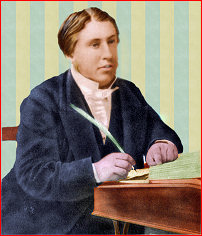 Here's a letter Charles Spurgeon wrote to his father within days of the younger Spurgeon's first visit to London. He had gone to preach a trial sermon for the famous congregation he would pastor for the rest of his life.
Here's a letter Charles Spurgeon wrote to his father within days of the younger Spurgeon's first visit to London. He had gone to preach a trial sermon for the famous congregation he would pastor for the rest of his life.
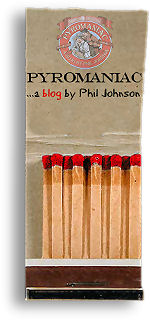 This is very good news:
This is very good news: 


 Several weeks ago, I began a series of posts critiquing the contemporary conceit that leads people to think God routinely gives them private revelation—either through subjective impulses, or by whispering inaudibly into their brains, or by otherwise employing their emotions as a barometer to reveal His will.
Several weeks ago, I began a series of posts critiquing the contemporary conceit that leads people to think God routinely gives them private revelation—either through subjective impulses, or by whispering inaudibly into their brains, or by otherwise employing their emotions as a barometer to reveal His will.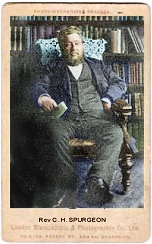
 I was suddenly awakened very early this morning by a loud noise. It jolted me out of the stupor of my sleep like a gunshot. In the fogginess of whatever dream I was having, I remember thinking it sounded as if a ceiling beam had suddenly snapped.
I was suddenly awakened very early this morning by a loud noise. It jolted me out of the stupor of my sleep like a gunshot. In the fogginess of whatever dream I was having, I remember thinking it sounded as if a ceiling beam had suddenly snapped. The commotion and chirping finally awakened the watch-beagle, and he was not happy. He started barking ferociously at the chirping smoke-detector, acting as if he had cornered a ferret or something on the ceiling.
The commotion and chirping finally awakened the watch-beagle, and he was not happy. He started barking ferociously at the chirping smoke-detector, acting as if he had cornered a ferret or something on the ceiling. The battery inside had exploded. Both top and bottom had been blown out of the battery, and there was some thick gray residue inside the smoke-detector. (The picture at the right is a photo I took of the actual battery.)
The battery inside had exploded. Both top and bottom had been blown out of the battery, and there was some thick gray residue inside the smoke-detector. (The picture at the right is a photo I took of the actual battery.)


 The angels sang something which men could understand—something which men ought to understand—something which will make men much better if they will understand it. The angels were singing about Jesus who was born in the manger. We must look upon their song as being built upon this foundation. They sang of Christ, and the salvation which he came into this world to work out. And what they said of this salvation was this: they said, first, that it gave glory to God; secondly, that it gave peace to man; and, thirdly, that it was a token of God's good will towards the human race.
The angels sang something which men could understand—something which men ought to understand—something which will make men much better if they will understand it. The angels were singing about Jesus who was born in the manger. We must look upon their song as being built upon this foundation. They sang of Christ, and the salvation which he came into this world to work out. And what they said of this salvation was this: they said, first, that it gave glory to God; secondly, that it gave peace to man; and, thirdly, that it was a token of God's good will towards the human race. I'm going to let the comment thread on yesterday's post develop a bit before pursuing the subject of the moral law's continuity. (I'll probably pick up the topic soon after Christmas.)
I'm going to let the comment thread on yesterday's post develop a bit before pursuing the subject of the moral law's continuity. (I'll probably pick up the topic soon after Christmas.)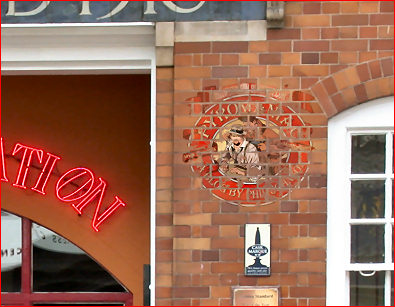
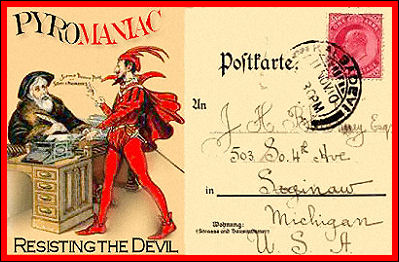
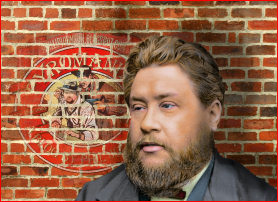 Among all the things I love about Charles Spurgeon, the impishness that occasionally surfaced in his sense of humor has to rank somewhere near the top of the list.
Among all the things I love about Charles Spurgeon, the impishness that occasionally surfaced in his sense of humor has to rank somewhere near the top of the list.